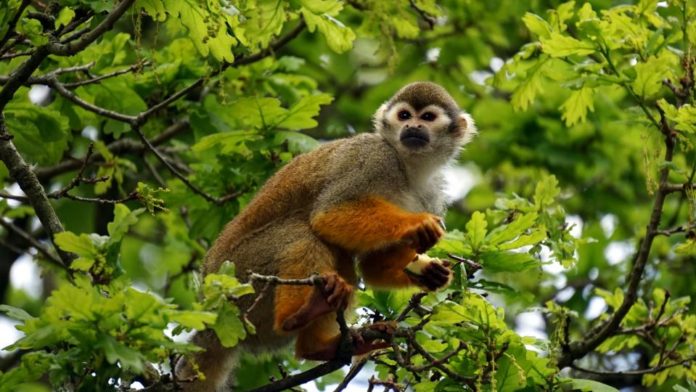Last Updated on January 27, 2024 by Fumipets
Considering Spider Monkeys as Pets: An In-Depth Exploration
Spider monkeys, with their long limbs and prehensile tails, exude a captivating charm that might entice exotic pet enthusiasts. However, the allure of having a monkey companion should be accompanied by a profound understanding of the responsibilities and challenges involved. In this guide, we’ll delve into the question of whether spider monkeys make good pets, exploring the intricacies of their care, behavior, and the ethical considerations that come with keeping these intelligent primates in a domestic setting.
Spider Monkeys as Pets
Humans have long been captivated by and sometimes horrified by wild creatures like the spider monkey. Wild animals may be utterly lovely, especially when they’re young, so it’s only reasonable to imagine how much fun it would be to have one as a pet.
The temptation is often much stronger when it comes to our closest relatives, the monkeys. Baby spider monkeys, who are adorable, smart, and sometimes dressed in diapers or baby clothing, are frequently offered for sale by exotic pet brokers. However, are spider monkeys suitable as pets? No, monkeys—including spider monkeys—do not make excellent pets, and we do not support keeping these creatures as pets.
Why Are Spider Monkeys Unsuitable as Pets?
The most straightforward response to this question is that wild creatures, such as spider monkeys, are not intended to be kept as pets. They can never be totally domesticated like domestic animals; they belong in the wild. Here are some further clarifications on why you shouldn’t get a pet spider monkey.

Pet Spider Monkeys Can Be Dangerous
Although baby spider monkeys are adorable, all infants ultimately grow up. A spider monkey’s behavior as an adult does not always follow that of a newborn spider monkey. No of how they were nurtured, adult spider monkeys will always remain wild creatures. They are powerful, erratic, often aggressive creatures with a mouthful of sharp teeth that, should they bite you, may do significant harm.
Because humans and spider monkeys are closely related, having a pet monkey might expose you to a number of illnesses or parasites.
Pet Spider Monkeys Are Often Illegal
Keeping a spider monkey as a pet may not be permitted depending on where you reside. Even if it is permitted, you could require a permit or adhere to stringent guidelines when it comes to housing and taking care of the spider monkey.
The illicit pet trade is only one of the factors threatening spider monkey numbers in the wild. Baby spider monkeys are often taken from the wild and sold as pets. There is no way to verify if you are truly buying an illegally obtained wild monkey, even if a pet spider monkey is purportedly captive-bred.

Pet Spider Monkeys Are Expensive
It will probably cost at least $10,000 and often more to just get a pet spider monkey. Adult spider monkeys need a specific habitat that might be costly to construct in order to live comfortably. As part of obtaining a permit to keep a monkey, these cages often need to be examined and authorized.
In captivity, spider monkeys may live for up to 40 years. You may spend up to 40 years providing food and housing for a 3-month-old spider monkey if you bring it home. Additionally, finding and affording veterinary care for a pet spider monkey may be quite difficult.
Pet Spider Monkeys Are Messy
The truth about those adorable images of young spider monkeys wearing diapers is that adult monkeys will not do so. Due to the persistent removal of their diapers and inability to adequately train them, adult spider monkeys pose a continual danger to your house and possessions. They could also pick up endearing behaviors like tossing or spreading excrement.
And if that weren’t enough, spider monkeys are very busy, inquisitive creatures with a human toddler’s level of maturity. They will cause destruction to your home as they climb and explore, creating a mess in their wake, if given the slightest opportunity. Additionally, they could endanger themselves by chomping on electrical lines or becoming entangled in window coverings.
https://www.youtube.com/watch?v=lj7BJsjnAZY
Pet Spider Monkeys Complicate Your Life
You may not have anticipated all the problems that come with having a pet spider monkey in your life. For instance, if you leave on vacation, who will care for your pet monkey?
This is something you’ll need to think about unless you decide to forgo vacations for up to 40 years.
What if you acquired your monkey when you were a young adult single and are now contemplating raising a family? Even if your spider monkey gets along with you, it doesn’t guarantee that they’ll accept new family members, particularly young children. They often respond poorly because they find this to be so distressing.

Pet Spider Monkeys Wonʻt Be Happy Or Healthy
Your pet can never really be happy, no matter how devoted an owner you are to your spider monkey. The main cause of this is because spider monkeys are very sociable creatures that live in contact with other primates. Without it, pet spider monkeys often exhibit problematic behaviour and neurotic tendencies.
It may be challenging to accurately mimic a pet spider monkey’s natural diet, which makes maintaining their health tough. Due to dietary concerns, a lot of pet spider monkeys have health complications, such as diabetes.
Conclusion
Even if images of infant spider monkeys in adorable clothes are enticing to you, think again before choosing to keep one as a pet. It doesn’t always make sense to domesticate a wild animal like a spider monkey just because you can.
Searching for groups that defend spider monkey populations in the wild or spider monkey refuges in their native Central and South America is a far better approach to channel your baby monkey passion. Or, research facilities closer to home that takes in abandoned ex-pet spider monkeys that were purchased as adorable infants rather than the true wild animals they would develop into.
Questions and Answers on Keeping Spider Monkeys as Pets
What Attracts People to the Idea of Having Spider Monkeys as Pets?
The playful and curious nature of spider monkeys, combined with their distinctive physical features, can make them alluring to those interested in exotic pets. Their intelligence and ability to form close bonds with humans contribute to their appeal as potential companions.
Are Spider Monkeys Legal as Pets, and What Regulations Exist?
Laws regarding the ownership of spider monkeys, like many exotic animals, vary widely. In numerous places, owning a spider monkey may be subject to strict regulations or outright bans due to the challenges associated with their care and the impact on their conservation status. Prospective owners must thoroughly research and comply with local and international regulations.
What Challenges Come with Keeping Spider Monkeys in a Domestic Setting?
Spider monkeys present numerous challenges as pets, including their need for a complex environment, a specialized diet, and ample social interactions. Their long lifespan, potential for aggression during maturity, and the requirement for extensive space further complicate their suitability as domestic companions.
How Do Spider Monkeys Behave in Captivity?
While spider monkeys are known for their playful and social behaviors, captivity can significantly affect their natural instincts. They may experience stress, boredom, and exhibit behaviors indicative of mental distress. Providing a stimulating and enriching environment is essential, yet even the best intentions may not fully replicate the complexity of their natural habitat.
What Ethical Considerations Should Potential Owners Acknowledge?
Ethical concerns surrounding the keeping of spider monkeys as pets include the impact on their conservation, potential for illegal trade, and the ethical implications of removing a wild animal from its natural habitat. Supporting reputable sanctuaries, conservation efforts, and advocating for the protection of these species in their natural environments are crucial aspects of responsible consideration.

















